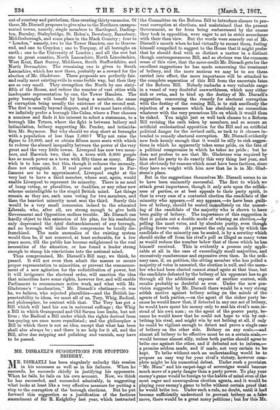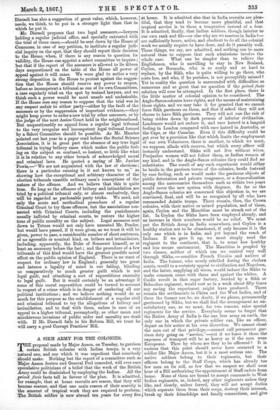MR. DISRAELI'S SUGGESTIONS FOR STOPPING
BRIBERY.
DISRAPLI has been singularly unlucky this session 1311 in his successes as well as in his failures. When he succeeds, he succeeds chiefly in justifying his opponents. When he fails, he fails on his own account. Now, we think he has succeeded, and succeeded admirably, in suggesting what looks at least like a very effective measure for putting .a stop to the corruption of the borough elections. But he put forward this suggestion as a justification of the factious amendment of Sir R. Knightley last year, which instructed
the Committee on the Reform Bill to introduce clauses to pre- vent corruption at elections, and maintained that the present Government, so far from being embarrassed by the- 'nurse they took in opposition, were eager to act in strict accordance with their then view. But the words were scarcely out of Mr.. Disraeli's mouth when he had virtually to recant them, feeling himself compelled to suggest to the House that it might prefer that he should deal with so distinct a matter in a distinct. though contemporaneous Bill, and so obvious was the common: sense of this view, that the more credit Mr. Disraeli gets for the- excellent suggestions he has made concerning the treatment
of bribery, and the more anxious we may be to see them carried into effect, the more importance will be attached to
the complete separation of this Bill from the uncertain fates- of the Reform Bill. Nobody embarks a very valuable cargo, in a vessel of very doubtful seaworthiness, which may either- sink or swim, and to bind up the destiny of Mr. Disraeli's. suggestion concerning the remedy for electoral corruption with the destiny of the coming Bill, is to risk needlessly the rejection of a measure which has absolutely no connection. whatever with the very precarious life on which it would then be risked. You might just as well tack clauses to a Reform. Bill revising the oath taken by members, and so secure an artificial ecclesiastical opposition for the Bill and an artificial political danger for the revised oath, as tack to it clauses in- tended to remedy electoral corruption. Mr. Disraeli evidently now feels keenly enough that it would be silly to risk sugges- tions in which he apparently takes some pride, on the fate of a political compromise in which he takes no pride ; but he does not profess to see that Mr. Gladstone was required by him and his party to do exactly this very thing last year, and that obviously for reasons which must have been factious, since- they have no weight with him now that he is in Mr. Glad- stone's place.
But in the suggestions themselves Mr. Disraeli seems to us to have been eminently successful. The first to which we- attach great importance, though it only acts upon the selfish- ness of parties, or at best appeals to their party spirit, is that in every case of a contested election the candidate of the- minority who appears,—if any appears,—to have been guilt- less of bribery, should be seated immediately on the unseat- ing of the candidate of the majority who is shown to have been guilty of bribery. The importance of this suggestion is that it points out a double mode of winning an election,—by polling the most votes, and by absolute purity, even though polling fewer 'votes. At present the only mode by which the- candidate of the minority can be seated, is by a scrutiny which should strike off from his rival's poll as illegal as many votes as would reduce the number below that of those which he has. himself received. This is evidently a process only appli- cable at all in the case of exceedingly small majorities, and excessively cumbersome and expensive even then. In the ordi- nary case, if, on petition, the• sitting member who has polled a majority of votes is unseated, the election is null, and the mem- ber who had been elected cannot stand again at that time, but the candidate defeated by the bribery of his opponent has to go through all the additional expense of another contest, with results probably as doubtful as ever. Under the new pre- vision suggested by Mr. Disraeli there would be a very strong selfish motive against bribery acting .on the minds of the- agents of both parties,—on the agent of the richer party be- cause he would know that, if detected in any one act of bribery, he would have spent his money only to seat his rival's man in- stead of his own man ; on the agent of the poorer party, be- cause he would know that he could not hope to win by out- bribing his rival, and might win by not bribing at all, if only he could be vigilant enough to detect and prove a single case- of bribery on the other side. Bribery on any scale,--and almost all bribery to be effective must be on a certain scale,— would become almost silly, unless both parties should agree to bribe one against the other, and if defeated not to inforni,.— a promise seldom made, and if made, not very certain to be- kept. To bribe without such an understanding would be to propose an easy way for your rival's victory, however com- plete might be his numerical defeat. Under such a provision "Mr. Mum" and his carpet-bags of sovereigns would become much more of a party danger than a party power. To play your enemy's game would be foreign to the habits of mind even of the most eager and unscrupulous election agents, and it would be playing your enemy's game to bribe without certain proof that he would bribe too. Under such a rule, no doubt, until it had. become sufficiently understood to prevent bribery as a false move, there would be a great many petitions ; but for this Mr.
Disraeli has also a suggestion of great value, which, however, needs, we think, to be put in a stronger light than that in which he put it.
Mr. Disraeli proposes that two legal assessors,—lawyers holding a regular judicial office, and specially entrusted with the trial of these cases,—should be sent down by the House of Commons, in case of any petition, to institute a regular judi- cial inquiry on the spot, that they should report their decision to the House, when, if there is any reason to question its validity, the House can appoint a select committee to inquire ; but that if the report of the assessors is allowed to lie fifteen days unquestioned on the table of the House all power of appeal against it will cease. We were glad to notice a very strong disposition in the House to protest against the sugges- tion that the House should reserve any power to reopen, before so incompetent a tribunal as one of its own Committees, a ease regularly tried on the spot by trained lawyers, and we think such a power would be most unsafe and undesirable. If the House sees any reason to suppose that the trial was in any respect unfair to either party—either by the fault of the assessors or by the suppression of important evidence,—they _might keep power to order a new trial by other assessors, or by the judge of the next Assize Court held in the neighbourhood. But unquestionably no appeal from a regular legal tribunal to the very irregular and incompetent legal tribunal formed by a Select Committee should be possible. As Mr. Maurice pointed out last year in a paper read before the Social Science Association, it is in great part the absence of any true legal tribunal in trying bribery cases which makes the public feel- ing on the subject so confused, so lenient, so little like what it is in relation to any other breach of acknowledged moral and criminal laws. He quoted a saying of Mr. Justice Fowis,—" We are not acquainted with the law of elections ; there is a particular cunning in it not known to us," as showing how the exceptional and arbitrary character of the election tribunals unsettle ordinary men's conceptions of the nature of the offence. And we believe that this is quite true. So long as the offences of bribery and intimidation are tried by a political tribunal only, or almost exclusively, they will be regarded as pardonable party tricks. We need, not only the acute and methodical procedure of a regular Criminal Court to try these offences, but the associations con- nected with Criminal Courts, including the punishments .usually inflicted by criminal courts, to restore the higher tone of public morality on the subject. Legal assessors sent .down to Totnes would not only have unseated Mr. Pender, but would have passed, if it were given, as we trust it will be given, power to pass, a considerable number of short sentences, of no agreeable or nominal kind, on bribers and intimidators, including, apparently, the Duke of Somerset himself, as at least an accessory before the fact ; and the procedure of a few tribunals of this kind would have the greatest possible moral effect on the public opinion of England. There is no want of respect for ordinary law in England ; generally too great and intense a legality of mind is our failing, blinding us comparatively to much greater guilt which is not legal guilt, and attaching a sort of superstitious enormity to legal guilt. But it would certainly be an advantage if some of this moral superstition could be turned to account in respect of a crime which is in danger of cankering all our political institutions ; and we believe nothing would do so much for this purpose as the establishment of a regular civil and criminal tribunal to try the allegations of bribery and intimidation, and to deal with them, unless in case of an appeal to a higher tribunal, peremptorily, as other mean and mischievous invasions of public order and morality are dealt with. If Mr. Disraeli fails in his Reform Bill, we trust he will carry a good Corrupt Practices' Bill.































 Previous page
Previous page